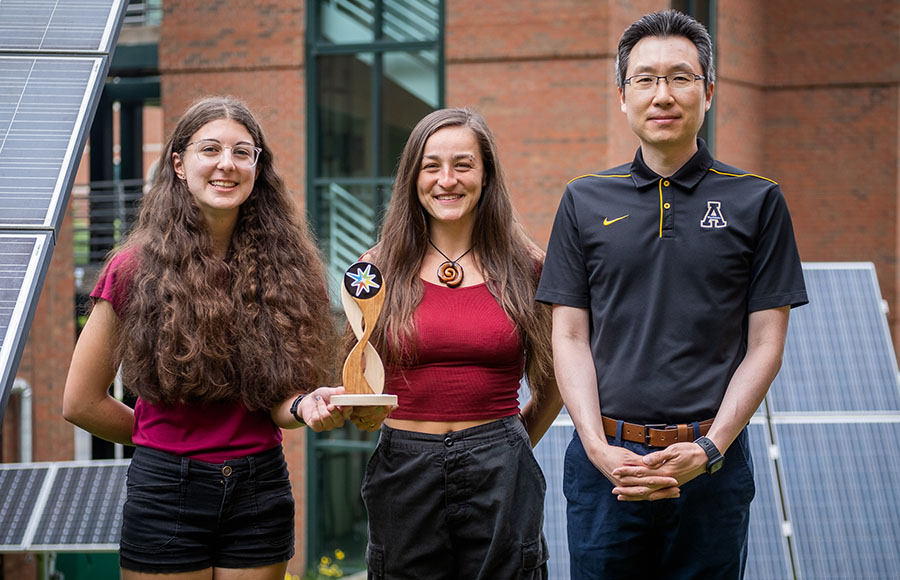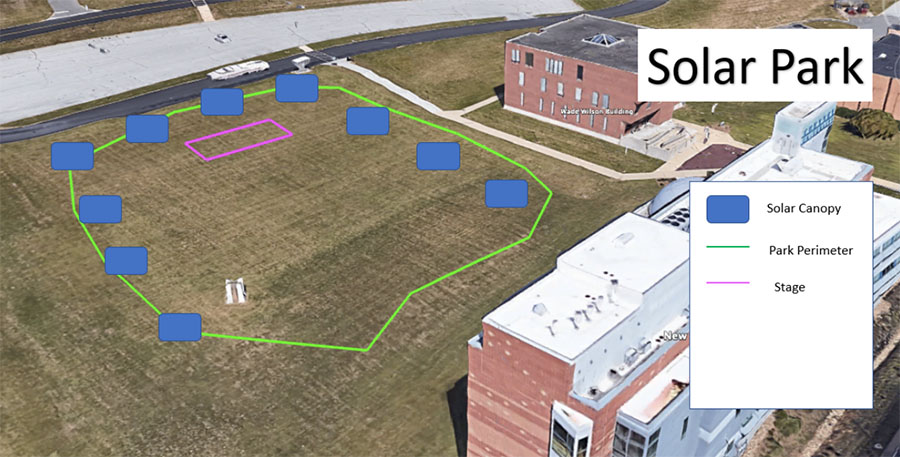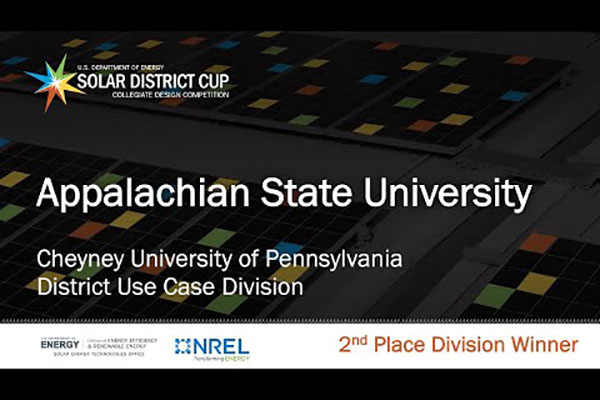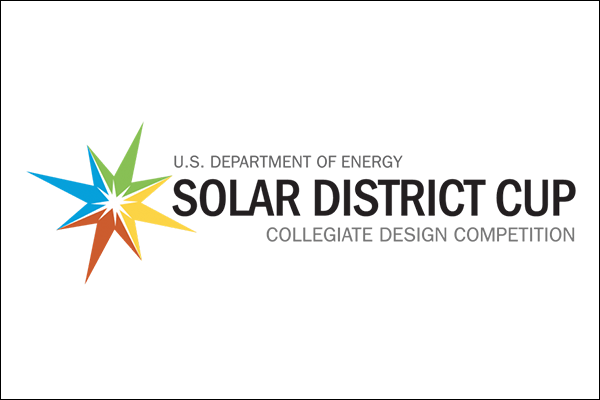
Grace Waugh, a senior sustainable technology major from Chapel Hill, far left, and Summer Gee ’20, a graduate student from Wrightsville Beach, center, were part of a multidisciplinary team of App State undergraduate and graduate students that won second place in its division in the 2021–22 U.S. Department of Energy Solar District Cup. Waugh and Gee are pictured holding the trophy that the team received and with the team’s faculty adviser, Dr. Jaewon Oh, assistant professor in the Department of Sustainable Technology and the Built Environment. Photo by Kyla Willoughby
BOONE, N.C. — Fourteen students at Appalachian State University are part of the next generation of renewable energy innovators — according to the U.S. Department of Energy (DOE). The student team, comprising undergraduate and graduate students in the College of Fine and Applied Arts, College of Arts and Sciences and Walker College of Business, won second place in its division in DOE’s 2021–22 Solar District Cup, which recognized the students for their solar power system design.
The Solar District Cup, now in its third year, challenges multidisciplinary student teams to design, model and present the most innovative and cost-effective renewable energy system possible. Teams compete in one of three divisions, each of which is structured around a mixed-use college campus or urban district.
“Inspiring students to join the clean energy workforce is critical to achieving our nation’s climate goals over the next several years,” said Garrett Nilsen, acting director of DOE’s Solar Energy Technologies Office. “The work these students are doing through the Solar District Cup is so valuable in preparing them for careers in the energy industry and beyond.”
Participating teams submitted designs and summaries of their proposed systems in November 2021, and the projects were evaluated based on their potential to maximize the district’s energy offset and financial savings over the life of the system while integrating aesthetic, infrastructure and community considerations.
App State’s team was one of 35 that advanced to the final stage of the competition, held in April. Each team had 15 minutes to present its project to a panel of industry judges during a live video conference, which was followed by 10 minutes of questions from the judges.
Grace Waugh, a sustainable technology major from Chapel Hill, said being part of this competition allowed her to learn more about the development of a commercial scale photovoltaic (PV) system, as well as to practice such skills as time management, communication and teamwork.
“This competition has been a wonderful resource as a current student and as a future leader in the sustainable energy industry,” she added.
Through an invite from App State’s Appalachian Energy Center, Waugh and her teammates also had the opportunity to present their award-winning solar project at the 2022 State Energy Conference of North Carolina, where they shared their design with hundreds of state energy and sustainability leaders.
Dr. Jaewon Oh, an assistant professor in the Department of Sustainable Technology and the Built Environment (STBE) who served as faculty adviser to the App State team, said, “App State is well known in North Carolina for its sustainable technology program. With this win in the national Solar District Cup competition, App State is positioned as one of the nation’s leading universities offering a superior solar energy curriculum.”
The following App State faculty also assisted the students with their project materials:
- Dr. Tammy Kowalczyk, professor in the Department of Accounting and director of App State’s Impact Clinic.
- Dr. Ram Poudel, assistant professor in the STBE department.
- Dr. Brian Raichle, professor in and chair of the STBE department.
- Dr. Sohad Abu-Elzait, assistant professor in the STBE department.
Solar powering a college campus
Solar District Cup teams designed their solar power systems based on data such as the district’s sustainability goals, electric utility rate schedule, development master plan and other relevant information provided in their division’s district use case. In addition, students were challenged to design battery energy storage systems that could increase solar capacity, shift load to shave peak power usage and serve as a resilience asset.
App State’s district use case for the competition was the Cheyney University of Pennsylvania, a public, historically Black university of more than 600 students located about 30 miles west of Philadelphia. The university is developing a climate action plan with goals to reduce campus consumption of natural gas and electricity — and eventually achieve carbon neutrality at a future date.

This graphic shows a proposed solar park for the campus of Cheyney University of Pennsylvania. The park is one component of a three-part solar power system designed by App State students who competed in the 2021–22 U.S. Department of Energy Solar District Cup, taking second place in their division for their design. Graphic submitted
To help the campus meet its climate action goals, the App State team developed a solar power system consisting of three PV array sites, along with a battery storage system. The proposed power system has an anticipated lifespan of approximately 25–30 years, according to the team, with an installation time frame of approximately eight months.
These systems are designed to seamlessly integrate into the day-to-day lives of students, faculty, staff and campus visitors and can be used for demonstrational purposes in coursework, workshops and campus activities:
- Solar park — A solar park located north of the university’s Science Building would include 10 carport-style solar arrays with picnic tables underneath. This green space, designed for events and/or outside classes, would also feature a small stage that can be used for university ceremonies and other activities.
- Agrivoltaics site — A proposed agrivoltaics research site, adjacent to the university’s Hill Library, has the potential to offset the library’s electric usage almost entirely over the course of a year. The site’s solar arrays would be built 12 feet above the vegetation planted underneath, which could include pollinating plants, medicinal herbs and/or crops. In addition, the site is designed to serve as an example of multiple land-use management — the arrays produce energy for the university’s grid while the remaining solar energy reaching the ground produces vegetation that supports biology students’ research and the biodiversity of the campus’s ecosystem.
- Ground-mounted PV array — A proposed ground-mounted PV array would serve as the largest solar site on campus and would be positioned on the campus’s south side, installed atop the underground geothermal heating system. The racks that hold this site’s solar panels are designed for easy setup and removal, to allow for convenient maintenance access to the geothermal system.
“App State’s Department of Sustainable Technology and the Built Environment provides exemplary teaching that both inspires and challenges students through experiential learning, synergistic curricula and community engagement,” Oh said. “Students learn problem-solving skills applicable to real-world problems.”
What do you think?
Share your feedback on this story.
About the College of Fine and Applied Arts
Appalachian State University’s College of Fine and Applied Arts is a dynamic and innovative group of seven academic departments, bringing together a variety of perspectives, experiences and real-world education to provide unique opportunities for student success. The college has more than 3,500 undergraduate and graduate majors. Its departments are Applied Design, Art, Communication, Military Science and Leadership, Sustainable Development, Sustainable Technology and the Built Environment, and Theatre and Dance. Learn more at https://cfaa.appstate.edu.
About the College of Arts and Sciences
The College of Arts and Sciences (CAS) at Appalachian State University is home to 17 academic departments, two centers and one residential college. These units span the humanities and the social, mathematical and natural sciences. CAS aims to develop a distinctive identity built upon our university's strengths, traditions and locations. The college’s values lie not only in service to the university and local community, but through inspiring, training, educating and sustaining the development of its students as global citizens. More than 6,800 student majors are enrolled in the college. As the college is also largely responsible for implementing App State’s general education curriculum, it is heavily involved in the education of all students at the university, including those pursuing majors in other colleges. Learn more at https://cas.appstate.edu.
About the Walker College of Business
The Walker College of Business at Appalachian State University delivers transformational educational experiences that prepare and inspire students to be ethical, innovative and engaged business leaders who positively impact their communities, both locally and globally. The college places emphasis on international experiences, sustainable business practices, entrepreneurial programs and real-world applications with industry. Enrolling nearly 5,000 students, including more than 4,500 undergraduates across 11 majors, the Walker College of Business has the highest full-time undergraduate enrollment in the University of North Carolina System. App State’s Walker College is accredited by AACSB International — the premier global accrediting body for business schools. Learn more at https://business.appstate.edu.
About Appalachian State University
As a premier public institution, Appalachian State University prepares students to lead purposeful lives. App State is one of 17 campuses in the University of North Carolina System, with a national reputation for innovative teaching and opening access to a high-quality, cost-effective education. The university enrolls more than 21,000 students, has a low student-to-faculty ratio and offers more than 150 undergraduate and 80 graduate majors at its Boone and Hickory campuses and through App State Online. Learn more at https://www.appstate.edu.














